Looking Backward to Move Forward with Hope at Luzerne County Community College
Written by Tony Mussari, Sr.
Edited by Kitch Loftus-Mussari
Photographs by Kitch Loftus-Mussari
Copyright Mussari-Loftus Associates, LTD 2014
All Rights Reserved
You can’t move forward until you look back. Cornel West
On a beautiful October morning, Kitch and I made our way to the Conference Center at Luzerne County Community College to look back at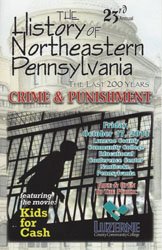 three episodes of Crime and Punishment in the history of Northeastern Pennsylvania.
three episodes of Crime and Punishment in the history of Northeastern Pennsylvania.
Dr. Thomas P. Leary, President of Luzerne County Community College, opened the event with a warm welcome and an expression of gratitude to the attendees, the participants and the organizers of the event.
When Mark J. Richetti, Jr., Executive Director of the Luzerne County Historical Society, addressed the audience, he reinforced the kind words of Dr. Leary and he thanked Dr. William Kashatus, the chairman of the conference.
Dr. Kashatus set the tone for the conference when he encouraged everyone to actively participate with questions and comments.
Justice with Honor
Dr. Mollie Marti, author of Walking with Justice 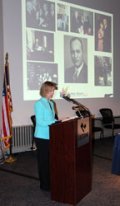 keynoted the conference. She shared several servant leadership lessons from her mentor Judge Max Rosenn.
keynoted the conference. She shared several servant leadership lessons from her mentor Judge Max Rosenn.
Five quotations from Judge Rosenn helped everyone better understand the man and his philosophy:
1. A leader’s true value is created by the compassion and healing he or she brings to humanity;
2. Celebrate what is right with the world…so you create more energy to help fix what is wrong;
3. In times of great uncertainty and need, you will have doubts. Also have hopes. Have dreams;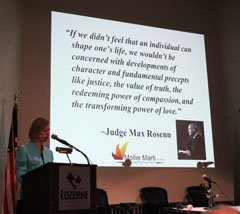
4. If we didn’t feel that an individual can shape one’s life we would not be concerned with developments of character and fundamental precepts like justice, the value of truth, the redeeming power of compassion and the transforming power of love;
5. Seize every opportunity to affirm others.
When Mollie finished her remarks, the lights in the room dimmed so the audience could watch Judge Max Rosenn: A Man for all Seasons. Kitch and I produced this program specifically for the conference. Drawn from a series of interviews we did with Judge Rosenn in 2004, it was our attempt to enable the most celebrated jurist in the history of Northeastern Pennsylvania to speak for himself about his life and his legacy.
After the screening, Mollie and I answered questions from the audience. For me, the most poignant and memorable question came from a student.
“Where can we find our heroes?”
Anthracite Labor Wars
In 2013, Dr. Robert Wolensky and William A Hastie, Sr., published a book 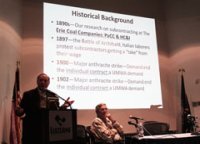 entitled, Antharcite Labor Wars: Tenancy, Italians and Organized Crime in the Northern Coalfield of Northeastern Pennsylvania, 1897-1959. On this day, they would trace the history of the anthracite labor wars in Northeastern Pennsylvania. Their presentation focused on the nature of crime and corruption in the anthracite industry.
entitled, Antharcite Labor Wars: Tenancy, Italians and Organized Crime in the Northern Coalfield of Northeastern Pennsylvania, 1897-1959. On this day, they would trace the history of the anthracite labor wars in Northeastern Pennsylvania. Their presentation focused on the nature of crime and corruption in the anthracite industry.
Using newspaper headlines and archival materials, they presented a litany of cleverly designed techniques used by mobsters and corporate executives to circumvent the legal system and discriminate against miners.
They also highlighted the activities of crusaders and reformers like Rev. John J. Curran and Rinaldo Cappellini who did everything they could to purge the industry of these captains of the night.
These excerpts and headlines from some of their slides will give the reader a better understanding of their presentation: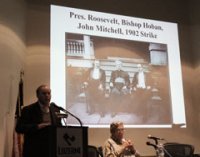
1987 the Battle of Archibald, Italian laborers protest subcontractors getting a “take” from their wages.
Opposition to IWW- I stand rigid and deep rooted with reference to the fight against the existence or perpetuity of such an organization (The IWW) in our community). Fr. John Curran 1916
The Murder of Detective Sam Lucchino, 1920
1 KILLED, 4 HURT BY BOMBS HERE
Dr. Wolensky ended his presentation with a quote from Michael 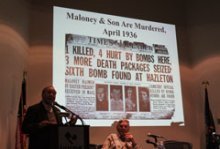 Woodiwiss, author of Organized Crime and American Power and Gangster Capitalism. The Woodiwiss quote challenged everyone in the audience to rethink one of the basic misconceptions about the origins of crime in the anthracite industry:
Woodiwiss, author of Organized Crime and American Power and Gangster Capitalism. The Woodiwiss quote challenged everyone in the audience to rethink one of the basic misconceptions about the origins of crime in the anthracite industry:
The mistake that has always dogged U.S. organized crime control efforts was the misperception that organized crime was composed of conspiratorial entities that were alien and distinct from American life. A great deal of evidence suggests the opposite. High-level politicians and respectable members of business and professional communities have gained more from organized criminal activity than any other group…
The Darkest Moment
Former Pennsylvania County President Judge and Juvenile Judge Mark Ciavarella Sentenced to Prison Term of 28 Years
Former Pennsylvania County President Judge Michael Conahan Sentenced to Prison Term of Seventeen And A Half Years
Despite Red Flags, Judges Ran Kickback Scheme for Years
The afternoon session was dedicated to a discussion of the Kids for Cash Scandal. Robert May, the producer of the movie Kids for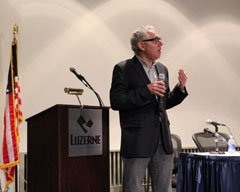 Cash talked about the rationale for the movie, its reception in cities around the country, and the positive reception it received in Washington, DC.
Cash talked about the rationale for the movie, its reception in cities around the country, and the positive reception it received in Washington, DC.
He shared excerpts from his film. One of these scenes contained an explanation of the “Zero Tolerance” philosophy that justified harsh punishments for juvenile offenders.
He emphasized the point that the film presents both sides of the issue. He also told the audience that disgraced Judge Mark Ciavarella, the author of Zero Tolerance in Luzerne County, gave him a reason to produce the film when he said that he hoped his work on the bench would produce some good.
Judge William Amesbury, journalist Terrie Morgan-Besecker and author 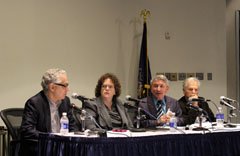 William Ecenbarger joined May for a panel discussion about the movie and Luzerne County’s juvenile justice system.
William Ecenbarger joined May for a panel discussion about the movie and Luzerne County’s juvenile justice system.
Judge Amesbury talked about how the Luzerne County juvenile justice system has changed since the scandal. He introduced several of the people who work with him to correct the abuses of the past and provide constructive alternatives that are centered in rehabilitation rather than incarceration.
William Ecenbarger is a Pulitzer Prize-winning journalist. He is a soft spoken man. His book Kids for Cash: Two Judges, Thousands of Children and a 2.8 Million Kickback Scheme chronicles the story of the abuses in the juvenile justice system and the culture that permitted it to happen.
During the discussion he was critical of the conditions that permitted the Kids for Cash scandal to happen. He also made the point that across the country one finds many examples of injustice to juvenile offenders that are rooted in a flawed public perception of the juvenile justice system.
Terrie Morgan-Besecker talked about her award winning series about the juvenile justice system in Luzerne County. She joined Judge Amesbury in complimenting Atty. Al Flora for the reforms he initiated when the Luzerne County Juvenile Defender Unit was created in 2010.
Flora’s cardinal rule was simple:
When charged by police with a delinquent act, all children are entitled to the constitutional right of effective assistance of counsel.
All the members of the panel agreed that the denial of this constitutional right to the youngsters involved in the Kids for Cash scandal was the most egregious offense.
Before the conference came to a close, Bill Kashatus summarized the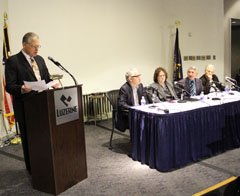 most important lessons learned during the sessions:
most important lessons learned during the sessions:
1. We must adhere to the rule of law in Luzerne County;
2. We must understand that kids are not small adults;
3. We must address family issues that are the root cause of many of the problems;
4. We will never fully understand why people do bad things, but we must continue to
explore issues like crime and punishment in Northeastern Pennsylvania;
5. Zero tolerance is a flawed philosophy;
6. Judge Max Rosenn is an example of character and integrity. He is a model for all of us;
7. Luzerne County is not the only place where corruption exists in America;
8. We need positive energy in the reform community.
The 23d Annual History Conference was a day of celebration, community, critical thinking and learning.
It was interesting, informative, at times painful, and thought-provoking.
An adaptation of the words of Carl Sagan applies:
You have to know the past, no matter how painful, to understand the present and improve the future.
Thank you, Luzerne County Community College for hosting the event.
Thank you, Luzerne County Historical Society for co-sponsoring the conference.
Thank you, Luzerne County Community College Food Service Department. Lunch was excellent.
A special thank you to the Community College AV-people for the professional way they managed every PowerPoint presentation and video.
Thank you, Bill Kashatus for making it happen.
The conference underlined the importance of history and the wisdom of Cornel West’s words.
As Kitch and I were leaving the conference center the words of David McCullough reverberated in my mind:
History is a guide to navigation in perilous times. History is who we are and why we are the way we are.
(The first two headlines in The Darkest Moment Section of this article were taken from press releases issued by the U.S. Attorney’s Office for the Middle District of Pennsylvania. The third headline is from an article that appeared in the New York Times on March 27, 2009)
Please provide feedback to:
tony.mussari@gmail.com